

I’ve always believed that democracy was the best form of government because people can change it. And like a lot of us, I was taught that the American form of democracy was the model that should be imitated by nations across the planet. Especially ingenious was the system of “checks and balances.” This arrangement means that no one branch of government can singularly decide a political course without the consent of the others.
This much-praised system was adopted to prevent the re-emergence of an autocracy. But checks and balances also worked to keep the practice of slavery alive up until the Civil War. And in the wake of abolition, when corporations became the dominant form of business organization, the same systems were used to exploit the labor force. Even as the country’s wealth grew, the gap between rich and poor widened. It took more than half a century of effort and the devastation of the Great Depression before important reforms like a minimum wage,
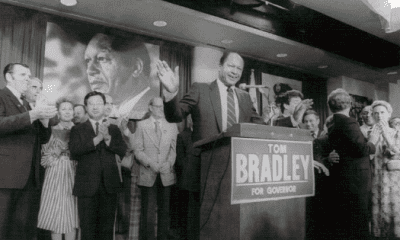
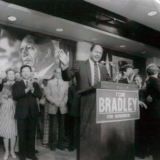
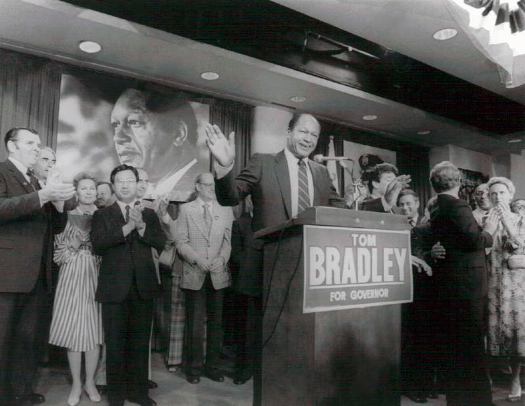 Any informed discussion about the politics and history of Los Angeles over the last century would have to include a critical assessment of the life and legacy of Tom Bradley. In the new documentary Bridging the Divide: Tom Bradley and The Politics of Race, filmmakers Lyn Goldfarb and Alison Sotomayor provide an in-depth look into Bradley’s life and career and their lasting impact on the city’s history, culture and political life. The two recently spoke with Capital & Main.
Any informed discussion about the politics and history of Los Angeles over the last century would have to include a critical assessment of the life and legacy of Tom Bradley. In the new documentary Bridging the Divide: Tom Bradley and The Politics of Race, filmmakers Lyn Goldfarb and Alison Sotomayor provide an in-depth look into Bradley’s life and career and their lasting impact on the city’s history, culture and political life. The two recently spoke with Capital & Main.
Capital & Main: What were your main reasons for doing this documentary?
Goldfarb: Because many of us don’t have a clear understanding about the history of Los Angeles. I think Tom Bradley’s story helps us understand LA better, who we are, and how we got to where we are.
 Sotomayor: When Tom Bradley became the first African American mayor elected in a major U.S.
Sotomayor: When Tom Bradley became the first African American mayor elected in a major U.S.
» Read more about: Bridging the Divide: New Documentary Explores Former L.A. Mayor Tom Bradley »
 I don’t know about you, but I love public parks. City parks for hiking, little league, and summer concerts. State parks for camping. National parks like the Grand Canyon to experience the awe of nature. Parks are some of our most precious public assets.
I don’t know about you, but I love public parks. City parks for hiking, little league, and summer concerts. State parks for camping. National parks like the Grand Canyon to experience the awe of nature. Parks are some of our most precious public assets.
But only if they remain public. This week, candidates in Kentucky’s gubernatorial election suggested that the state could privatize parks to raise revenue. That’s a misguided solution to the wrong problem: the state’s failure to invest enough in essential public assets. Advocates of privatization say the private sector will attract more tourists. But that would jeopardize the central mission of public parks to provide affordable access to nature and recreation. Parks managed by companies, like other private assets, will need to generate profit—funds that should be spent on maintaining and improving them.
The citizens of Kentucky aren’t alone. To manage the 14 million acres of state park lands in the U.S.,


As lobbyists and state legislators gathered at San Diego’s Grand Hyatt resort last week for the three-day annual meeting of the American Legislative Exchange Council (ALEC), the delegates seemed to barely glance at the several dozen exhibitor tables that made up a sort of carnival sideshow of right-wing groups outside the hotel’s second-floor warren of meeting rooms.
Convention attendees had more pressing concerns. Namely, turning this year’s corporate wish list into the infamous boilerplate bills known as “model laws” that would aspire to undermine things like health and environmental standards, worker rights, campaign-spending limits and implementation of the Affordable Care Act (ACA) across the 50 states.
See more of our coverage of the ALEC Annual Meeting
Many of the exhibitor booths were occupied by familiar ALEC friends, such as the collection of extreme-right think tanks known as the State Policy Network,
…mill hands, farm hands, factory hands…hands….hands…hands…
— Eugene Debs
Ironworker Devonte Merrifield makes sure he takes care of his hands. He jokingly points out that the strength of his marriage depends on two strong – and sometimes soft – hands. “My wife complains because I can’t rub her back anymore because of my calluses. My hands can be a little rough,” he says, lifting his hands and smiling.
Merrifield is in some ways similar to my electrician father who believed that the feel of a person’s hands might indicate something about their character. Shaking my father’s hand was not merely a polite ritual. The absence of thick pads of calluses was, for him, one indication that you might not be contributing much to society.
Merrifield knows that what he does with his hands is deserving of a measure of respect. His identity is partly bound up with what he calls his “working man’s” hands and the confidence drawn from meeting the challenges of apprenticeship.

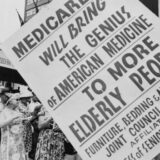
Fifty years ago this month, on July 30, 1965, President Lyndon Johnson signed into law an amendment to the Social Security Act that established Medicare, providing health insurance to people 65 and older regardless of income or medical history, and dramatically changed the landscape of senior health care for the better. As we celebrate this important anniversary, all of us should take a moment to consider how Medicare, the nation’s most successful and efficient health insurance program, continues to protect millions of seniors who might otherwise live without adequate health care or who might face bankruptcy because of medical bills.
As Medicare has been weaved into the fabric of our society, it’s hard to fathom a time when America placed its aging population at such risk, but prior to Medicare only 50 percent of Americans 65 and older had health insurance, and more than a third lived in poverty.
» Read more about: Celebrating Medicare’s 50th by Ensuring Medicare for All »


 When Medicare was signed into law on July 30, 1965, nearly half of Americans over 65 had no health insurance, and many more lacked adequate coverage. Today, only 2% of senior citizens in the U.S. are uninsured. To celebrate the success of Medicare and rally for universal expansion of the program, events are being held in more than 2 dozen cities across the country.
When Medicare was signed into law on July 30, 1965, nearly half of Americans over 65 had no health insurance, and many more lacked adequate coverage. Today, only 2% of senior citizens in the U.S. are uninsured. To celebrate the success of Medicare and rally for universal expansion of the program, events are being held in more than 2 dozen cities across the country.
The Los Angeles version will predictably have strong entertainment. There will be musical performances by Lili Haydn, who’s been called the “Jimi Hendrix of the violin,” along with Latino Hip-Hop group the Inner City Dwellers and musical parody group Billionaires for Wealthcare.
Also on the program are actor Mike Farrell of M*A*S*H, Richard Montoya of the performance troupe Culture Clash, State Senator Holly Mitchell, L.A. County Supervisors Sheila Kuehl, Hilda Solis, and Mark Ridley-Thomas,
» Read more about: This Thursday: Medicare is Having a Birthday Party »


Earlier this month, in yet another win for local control, leaders in one central Florida county rejected a proposal from a for-profit library management company to take over their public library. The company, Library Systems & Services (LSSI), operates at least 80 public libraries across the country, but Marion County joins a growing list of municipalities that realized that LSSI’s claim to do more with less while still making a profit was a greater fiction than even Stephen King’s best stories.
In 2010, the chief executive of LSSI admitted to the New York Times that the company saves money by cutting overhead and replacing unionized employees. “Cutting overhead” can mean fewer services and reduced hours. Privatized libraries make up for less professional staff by depending on unpaid volunteers and automation. Of course, when outsourcing relies on cutbacks in wages and benefits to realize savings,
» Read more about: Calabasas and Other Towns Reject Privatized Libraries »


If you take your kids to the beach this summer, expect a gritty ride home. California has turned off most of the showers that people use at state beaches to clean the sand off their kids before the long ride home. Then, of course, you get to clean the sand out of your car. All this aggravation saves about 18 million gallons of water a year, according to the state.
In a drought like this one, it makes sense to conserve as much water as possible, wherever we can. So you would think we would be trying to stop some big water users too. Like Chevron. This mega-corporation sells 21 million gallons of treated polluted water a day to the Cawelo Water District, which, according to the Los Angeles Times, provides water to 90 Kern County farmers.
Where Chevron gets the water,
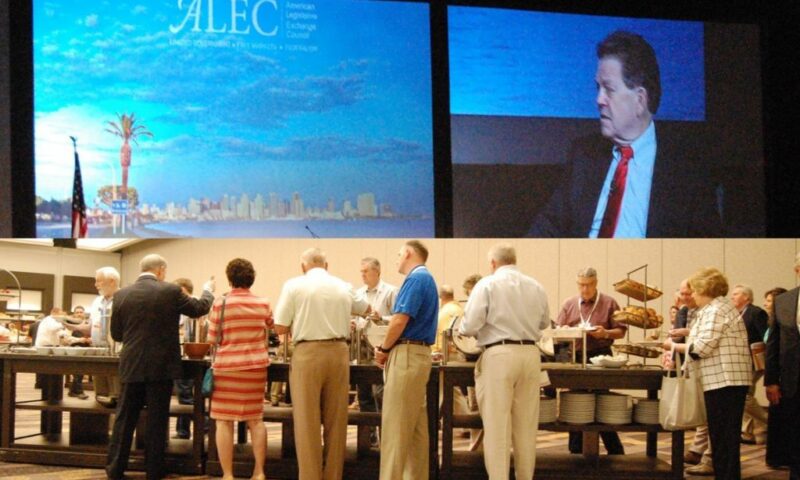

“The biggest scam of the last 100 years is global warming!” thundered Stephen Moore to ALEC’s plenary breakfast club this morning. “It’s no surprise that when you give these professors $10 billion, they’re going to find a problem.” Moore then singled out North Dakota for its regulatory-free attitudes toward the fracking industry: “I just have one message for you — drill, baby, drill!”
See more of our coverage of the ALEC Annual Meeting
The annual meeting of the American Legislative Exchange Council began wrapping up business in San Diego Friday on this defiant note from Moore, a former Wall Street Journal writer. This newly hired Heritage Foundation economist is an apostle of completely eliminating state income taxes and has been in a running feud with liberal economist and New York Times columnist Paul Krugman, over Moore’s casual regard for accurate reporting.
Moore’s speaking partner today was fellow supply-sider Arthur Laffer,
» Read more about: ALEC Confidential: Tales from the Supply-Side »